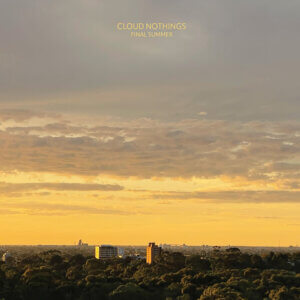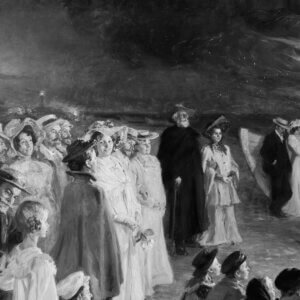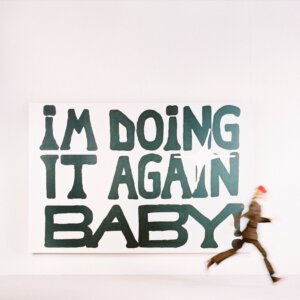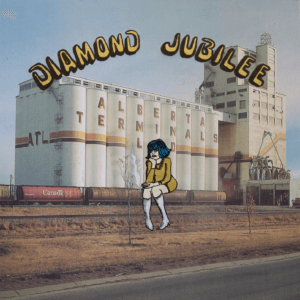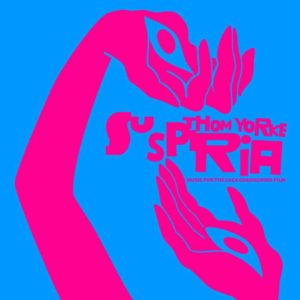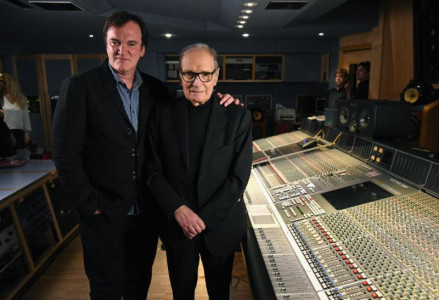Morricone Youth’s Movie Magic
What started out as a fun side-project for about 10 different bands is now a multimedia beast in its own right. Starting as far back as 1999, Morricone Youth started by reinterpreting old film scores until they started making their own music for the movies, and things really started to take off. Reinterpreting and crafting new music for everything from “Mad Max” to their most recent release with “Sunrise: A Tale of Two Humans” they’ve done a little bit of everything over the years. Touring with famous Italian prog-rock film composers Goblin over the next few months, the band is at a career high right now. We sat down with founding member Devon E. Levins to talk about the evolution of the band, movies and how exactly they do a traditional concert.
Northern Transmissions: Your band’s composed of members from a lot of different bands, so how did you all start making rock-film scores together and how did it progress to where it is now?
Devon E. Levins: The band started in ’99 in New York City with a bunch of people from different bands. It really started as a side project, next to everyone’s main gigging bands. We were all interested in reinterpreting these old film scores, basically as covers but more in a rock style. Morricone covers Mancini, whatever we wanted. Quickly that band started getting more gigs and opportunities than our main bands. Then in 2004 we did an imaginary soundtrack. Nothing really happened though until 2010/2011 with a whole new group of people besides me and John Castro who’s been with us since 2001. The first film we scored with this group was “Eraserhead” and then the Nighthawk Cinema started approaching us for more midnight movies. We weren’t sure because we’d mostly just done silent films so were hesitant. They thought a lot of the dead-air of some of these movies could be improved with some prog-rock. The silent films are more fun because it’s just us, where as the midnight films have songs that may need to be reinterpreted. Living in New York City and playing for so long, we meet a lot of people. So over the years people have come in and out and back into the band, we have members from California and even Scotland.
NT: Looking at your writing styles, how do you differentiate writing something original for a film vs reinterpreting scores?
DEL: It depends on the film. We’ve done 15 full feature-length film projects, 12 or 13 are mostly original. There’s three where we knew taking them on that the soundtrack was more or less perfect. We’re playing some of the them note-for-note to the best of our ability, but then again we’re not the Wrecking Crew, we have around eight players instead of 20. A lot of times there’s sound-down with lots of dialogue, and we’d take liberty to write music that could enhance a film. We’re trying to bring these films to a new generation who might not pay 10 or 15 bucks to see it without the interesting hooks. It’s really about getting people into theatres and hope the music enhances it. I’m a huge film fan so I’m hypersensitive to not stepping on peoples parts. But sometimes by the nature of all the hooks, the music can get slammed together or it’s just licensed library music, so we’re just trying to make more of a live experience for film. Maybe in some instances we’re making it worse but it’s all part of a live experience.
NT: How has your time hosting the Morricone Island show and interviewing composers shaped your understanding of the craft?
DEL: There’s definitely patterns that I’ve seen. I started the show when the band was in hibernation. I’ve been collecting records my whole life, hardcore, punk and all that since I was a kid. Then in the 90s I started buying film scores and tried to figure out what they were playing. So I’m trying to introduce people to these songs that they might not hear. Composers started contacting me about getting on the show, and I really started to enjoy interviewing people. Everybody got into film composing in a different way. It’s never just “I was a prodigy and I started under the tutelage of so-and-so.” Whether it’s Danny Elfman or Ennio Morricone, they all get there differently. A lot of them deal with the issue of temp music, and how the studios want it but can’t pay for it, it’s kind of like us choosing to cover or throw out music. I have to turn away people now, so many people are interested, and there’s a lot of composers around these days. You look at Goblin, they started with trying to compose for films and eventually developed to albums and going on tour.
NT: How did this whole tour with Goblin come about, I know you’d interviewed them before but this just seems like a dream pairing if there ever was one?
DEL: Through mutual friends it became known that we were interested. I’d interviewed both Claudio Simonetti and Maurizio Guarini separately on the two tours they did. They had really perfect bands for those tours too. It’s really an honour to be asked to play with them, it was a mixture of being asked because we were relevant to them, but we also had these mutual friends.
NT: On this note, you guys are mostly doing live performances to films so when you’re approaching a tour like this how do you pick a setlist and what changes about your physicality on stage?
DEL: Actually doing it now is pretty daunting. We have an album of original music, and then we have 150 reinterpretations of music we’ve done over the years, including Goblin itself. We have these 15 films we’ve scored and now we have to fit it all into 45 minutes. We’re hoping that some of this music translates visually to the context of this. Going into our score interpreting process, we started moving towards stuff that we could use as a blank canvas that would work without the visuals really. Some times when we play a rock club, we like to have visuals if ever possible. We like to have visuals, not necessarily as a live scoring but something like a trailer for context. To me it might be nice to do it without, not being locked down to that and hoping it interprets well to the crowd.
NT: Considering you’re starting your tour during the haunting season of Halloween, I was curious how your classic look of playing the ‘Halloween’ theme in Michael Myers’ masks started and have you run into any issues playing with them on?
DEL: There’s photos and a video from a Halloween party in Manhattan. There’s times where we do the whole set with the masks on but usually they disappear from a few members, some have even customized them, I still have them all. For our sax player it was rough, he’d have to cut out the mouth and ears rattled so much that he cut them out. I don’t think we’re wearing them on this tour haha. Maybe on Halloween in Philadelphia, but they’re not too fun to play with, because they’re so hot, and they’re really just for one-offs, but we always end up playing on or around Halloween.
Words by Owen Maxwell
Latest Reviews
Tracks
Advertisement
Looking for something new to listen to?
Sign up to our all-new newsletter for top-notch reviews, news, videos and playlists.
